Last updated on March 29th, 2024
Survey on women’s solo travel safety shows the importance of self-defense
by Carolyn Ray
Our 2021 survey on women’s solo travel safety showed some interesting insights. First, that 88% of women say they were somewhat threatened or felt unsafe while travelling. Of these, 38% were able to defend themselves; 16% had help from another person and 13% were not able to defend themselves;
As experienced travellers, we know that there are always risks to travel. And as we age, we feel even more vulnerable. Our survey showed that 12% of women have been physically attacked or threatened while travelling and 97% do not feel they have the physical skills to defend themselves. Many more raised concerns about feeling increasingly vulnerable due to their age or mobility. Completed by over 350 women, almost 90% of respondents were age 55 and over.
With this in mind, we created a series of classes on women’s self-defense skills with self-defense expert Lorna Selig from Safe4Life. You can read or watch the April 15 session here.
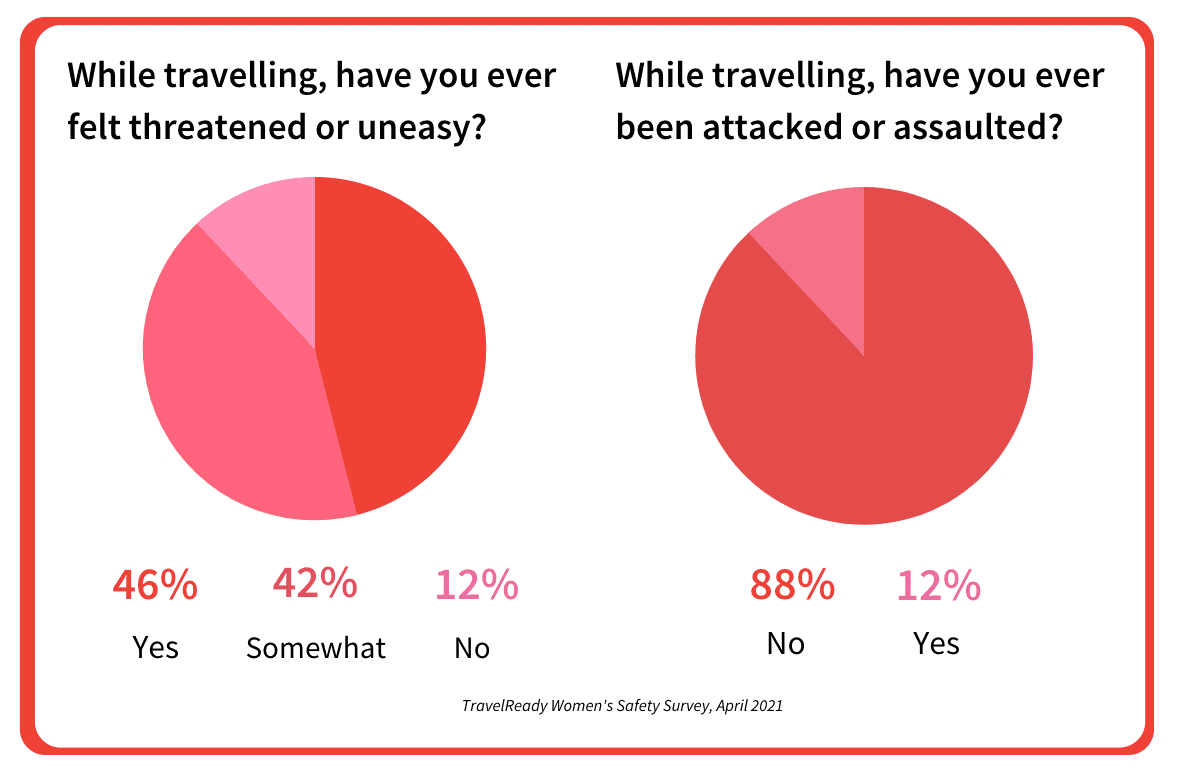
Women’s safety is a problem at home, too
Women’s personal safety isn’t just confined to travel; it affects us at home too. According to UN Women, almost one in three women have been subjected to some form of violence at least once in their life. Even if you haven’t been subjected to abuse, the prevalence of the issue means someone you know — a family member, a colleague or a friend — has. The recent abduction of Sarah Everard by a police officer in London sent shock waves around the world. News reports say she was doing all the right things: “She chose well-lit streets and spoke with her boyfriend by phone. She did many of the things women are advised to do to improve their safety, yet she didn’t make it home.”
The UN reports that since the outbreak of COVID-19, all types of violence against women and girls, particularly domestic violence, has intensified. BBC reports that ‘Covid hate crimes’ against Asian Americans are on the rise. Most of our respondents — 85% — believe that women’s personal safety will be as important or more important post-pandemic.
We must commit to ourselves to honour those moments when we don’t feel safe and actively take steps to protect ourselves. To do that, we need a plan, and we need practice. A safety mindset is a start, but by learning self-defense skills, we can feel empowered to take control of any situation, moving into a position of control.
10 insights from our survey on women’s solo travel safety
Our survey shows that safety continues to be of utmost concern to women. If nothing else, the pandemic has given us an opportunity to make a new commitment to our own safety.
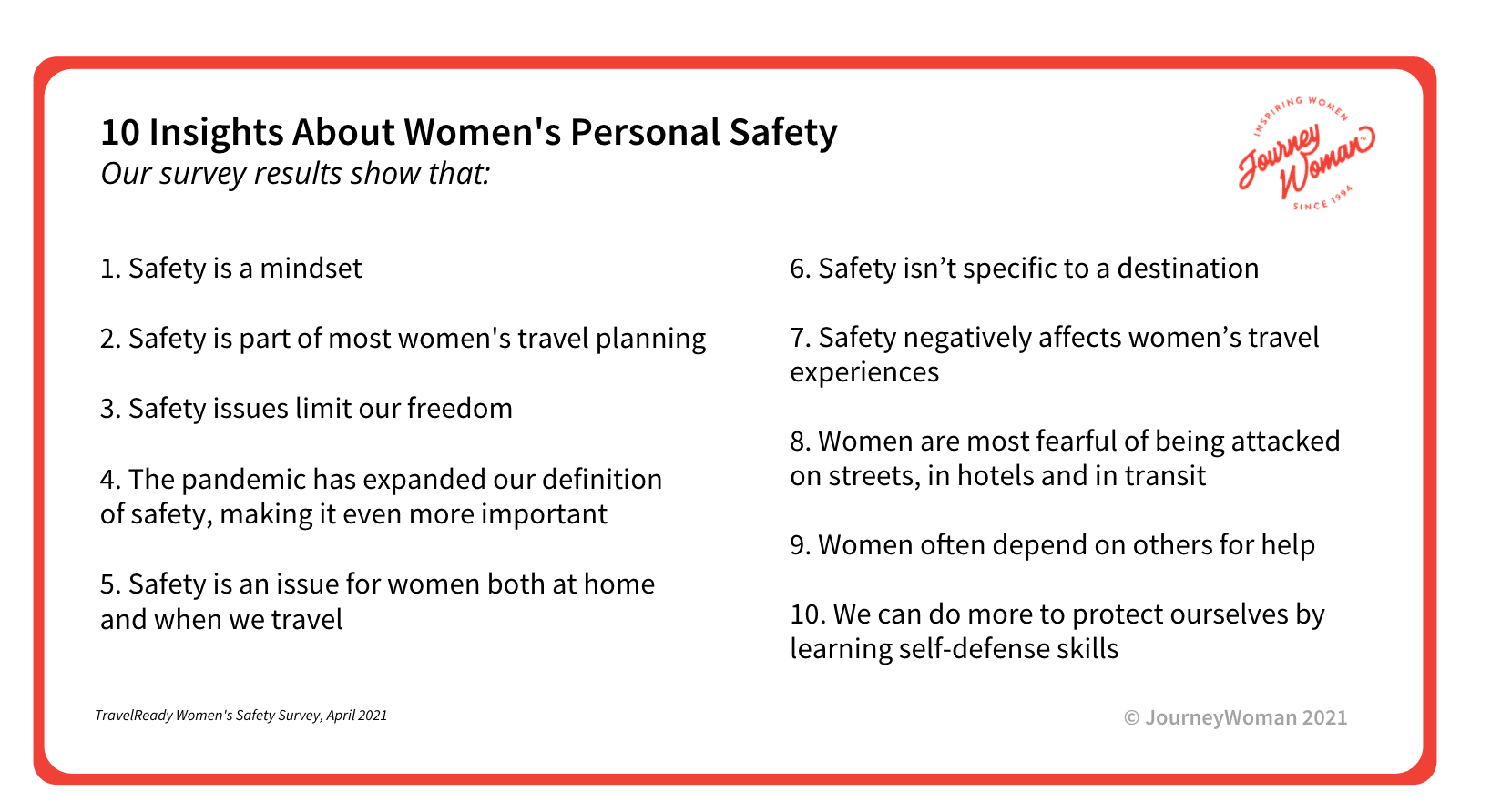
1. Safety is a mindset
In our survey, we asked women to share their safety strategies while travelling.
While these five rose to the top, other items included: Carry a safety device, take self-defense training, connect with a woman in the place you’re visiting, travel with a friend or partner.
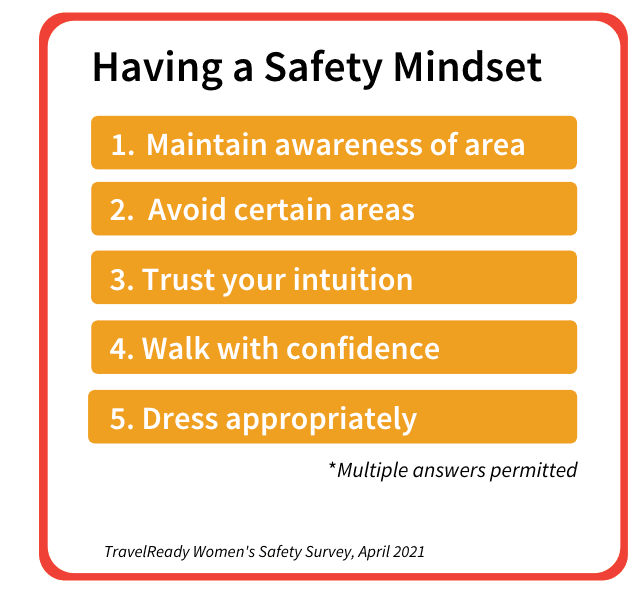
2. Safety is part of most women’s travel planning
Most women say safety is part of their travel planning process, which further demonstrates the importance of safety to women.
“I’m usually conscious of my surroundings and think ahead and plan most of the time; but there have been times when I’ve wondered if I’ve made the right decisions.”
“I take precautions, but physically can be overpowered. I am 69.”
“Safety is and always should be taking personal responsibility for your own security, threat levels and back-up plans. Preparing is relieving stress and taking control of your own mindset.”
3. Safety issues limit our freedom
“As a woman, being able to move about freely all over the world without having to worry about personal safety, is my definition of safety in the context of future travel.”
“…being able to safely walk alone in cities and country without fear.”
“Safety means “being fully prepared for whatever may come my way.”
4. The pandemic has expanded our definition of safety, making it even more important
For travellers, safety is more complicated than ever before. It goes beyond personal safety to include accommodations and medical facilities, transportation and cleanliness and hygiene.
“Safety for me means transport and countries being COVID safe.”
“Medical safety, access to medical services / covid-free areas”
“Safe planes… the pandemic definitely has me thinking about air circulation in enclosed spaces.”
5. Safety is an issue for women both at home and when we travel
In our survey, women shared experiences where they felt threatened:
“Alongside an interstate highway while pulled over with an overheated car.”
“In a forest at about 4:00 pm.”
“The US. Despite being a citizen, I won’t travel here alone. I’ve been to Europe and Middle East & felt safer there alone.”
6. Safety isn’t specific to a destination
In our survey, most women agreed that safety is more about a mindset, and less about the destination.
“As females, we are vulnerable anywhere.”
“No country is free of individuals who commit hate crimes or sexually assault or harass women.”
“I think every country has its unsafe area for tourists in general. Women alone are more of a target but this is the case in sketchy areas of Detroit as much as more lower income areas of Johannesburg.”
“Any place/city/country, including Canada, is potentially not safe from violent men who prey on women.”
“I was taking pictures during the day and out without a partner. A man approached me and told me that there was a man across the street watching me with my camera (Canon AE 1) and that I should go inside the area close to the hotel. This was in Costa Rica.”
Recognizing that safety is subjective, women did recommend the countries below as more or less ‘safe’, based on their own personal experience.
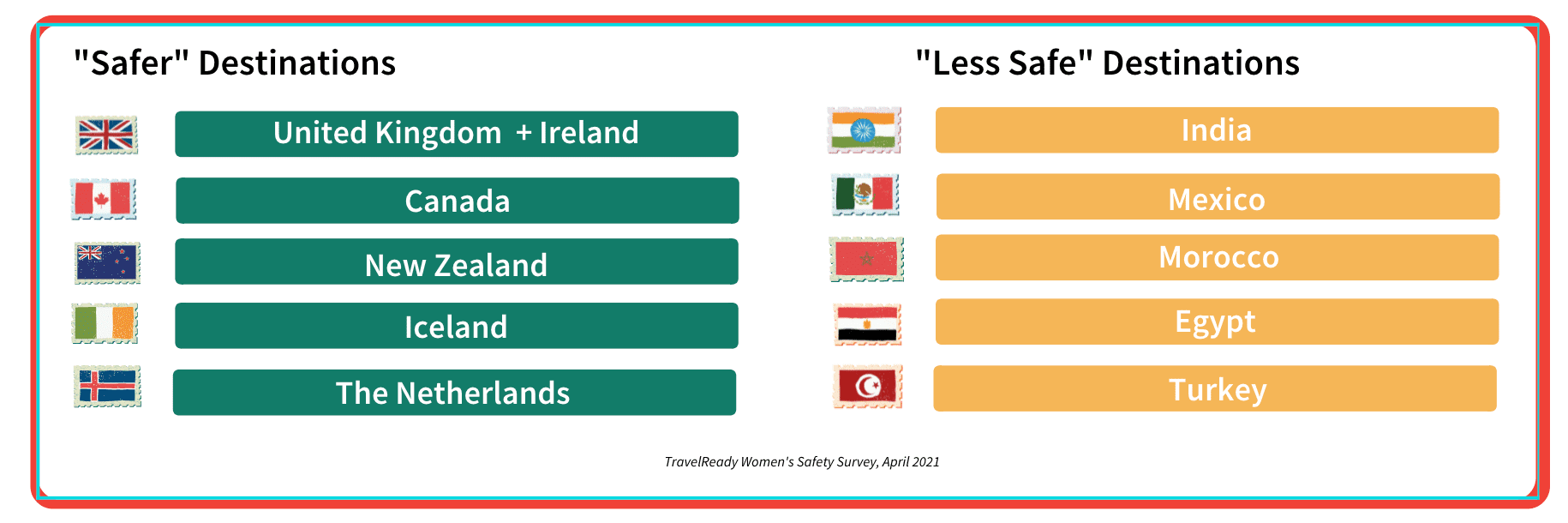
7. Safety negatively affects women’s travel experience
“I rarely go out at night when traveling alone to restaurants unless it seems very safe. I have nicer meals at lunch and at night eat very close to hotel or picnic in or near a hotel. I’m missing some evening travel experiences!”
“Sometimes I feel that I am being aware but there are times when in some travel the situation can change quickly and I don’t feel very prepared.”
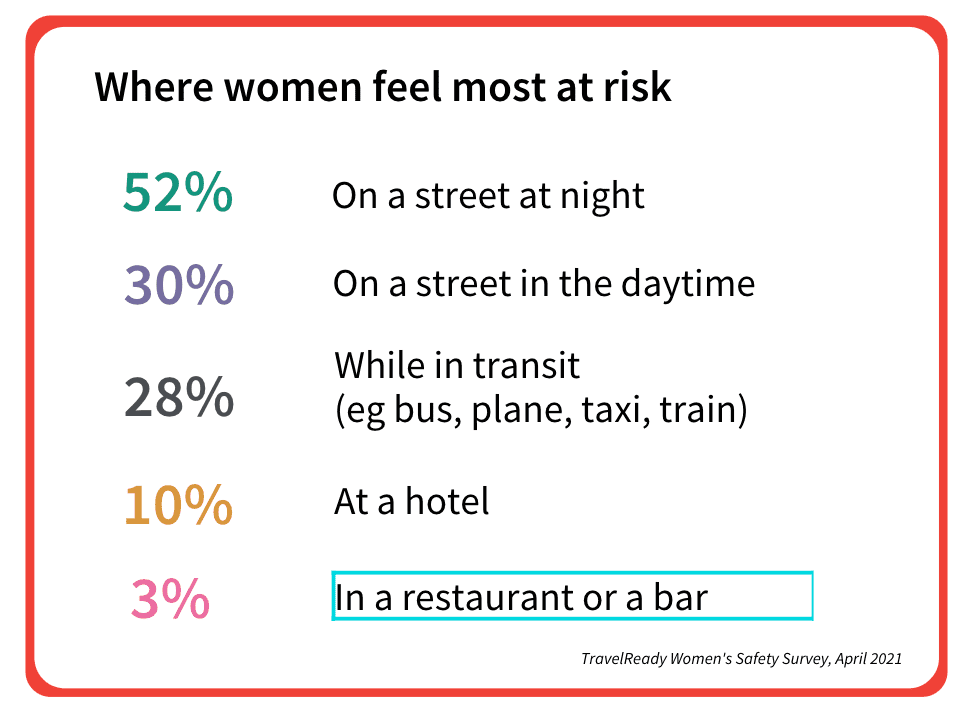
8. Women are most fearful of being attacked on a street, in a hotel and in transit
Most women fear being attacked on a street at night, on a street in the daytime, while in transit (airplane, taxi, train, bus), or at a hotel.
“I was walking briskly at night on a major street in a major city overseas returning from a theatre. I did not speak the native language and couldn’t figure out the taxi situation. Two young men came up behind me, one on each side, and one said he was hungry. I continued walking and I repositioned my bag and prepared for it to be jerked from me without me getting hurt. Within about one or two minutes, a taxi pulled up, asking if I needed a ride and the two skedaddled away. I made it safely to my hotel which was a half block down the main street.”
“I was followed down streets by a driver and believe I just missed being kidnapped. The manager of small hotel opened the door at the same time the stranger was reaching for me.”
“I travelled to Edmonton and was assaulted in a busy street in daylight. This is what catches people off guard.”
But other places were mentioned too:
“On a beach in daylight, attacked at knife point.”
“On the beach in Rio.”
“Parking garage.”
“On a date while travelling.”
“A hotel rooftop pool.”
“I was followed for quite some distance by a very persistent man. I think he was waiting for me to be alone.”
“On a scheduled excursion — explained I was travelling alone and wanted to be booked with a group. When the tour leader picked me up, I found out I was the only guest. Turned out okay but I was very nervous …”
“I’ve been followed to my room but locked the door successfully.”
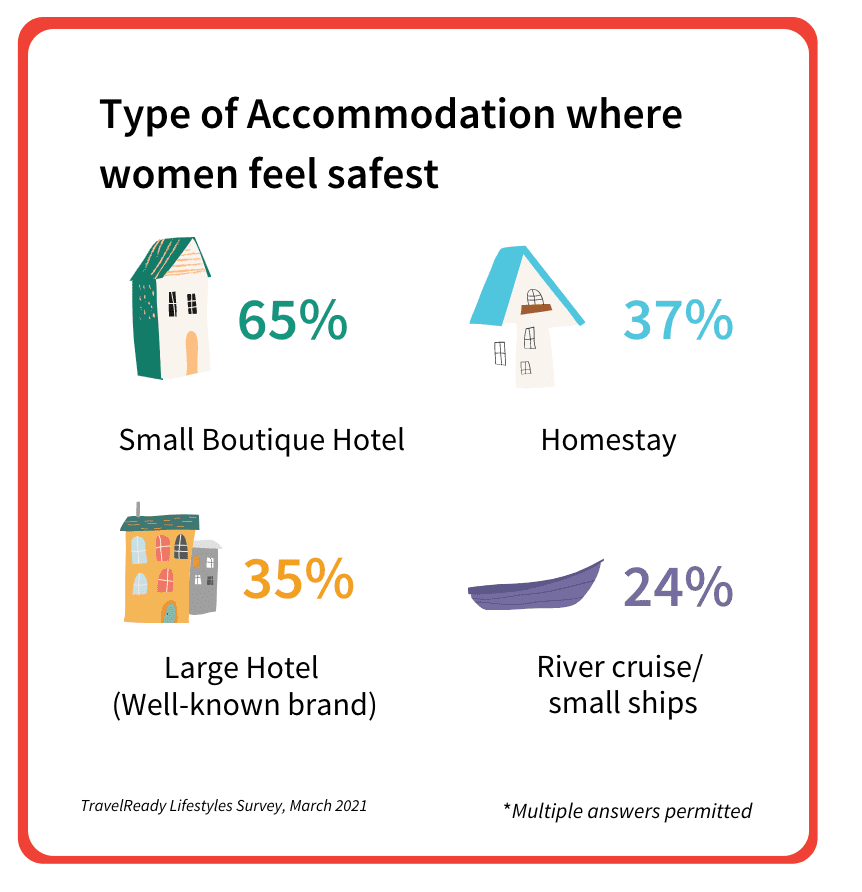
9. Women often depend on others for help
“People came to my assistance only once I yelled that this stranger was attacking me. Another issue is with people who do not want to get involved. Providing guidance to bystanders would be valuable.”
“With a girlfriend, we were able to escape.”
10. We can do more to protect ourselves by learning self-defense skills
A quick Google search reveals thousands of articles with safety tips for women, yet we continue to see horrifying statistics about attacks on women. As women, we must take charge of our own safety — we are the only ones who truly can. Sometimes we hesitate to remove ourselves from a situation or establish our boundaries. In many countries, there are cultural norms that inhibit women from standing up forcefully and loudly against predators.
After doing two self-defense sessions with Lorna Selig of Safe4Life and her 90-minute training class, I am convinced that we must learn self-defense skills to protect ourselves. We must learn to use the power of our own voice to defend ourselves and commit to honour the moments when we don’t feel safe by taking action to protect ourselves.
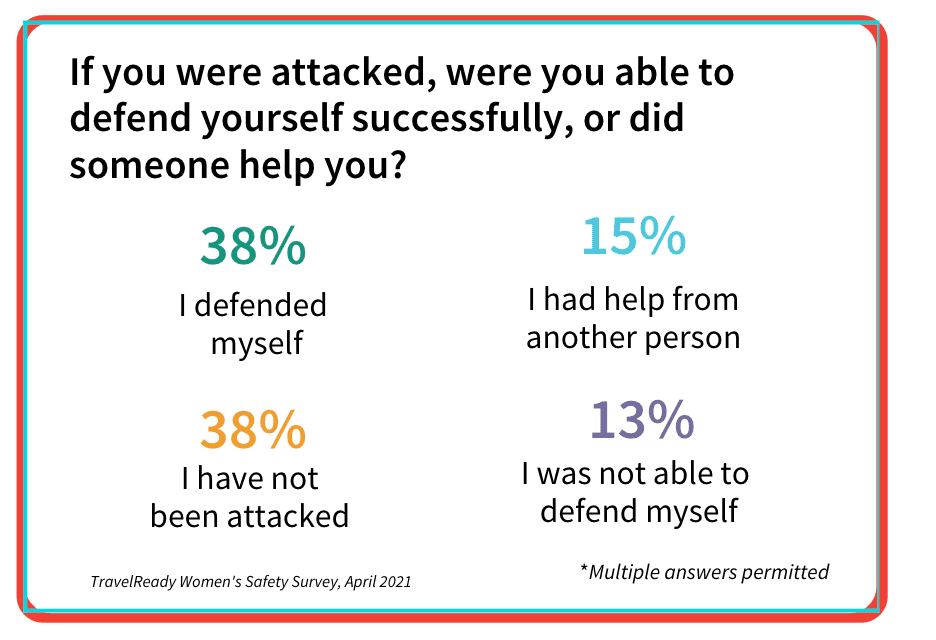
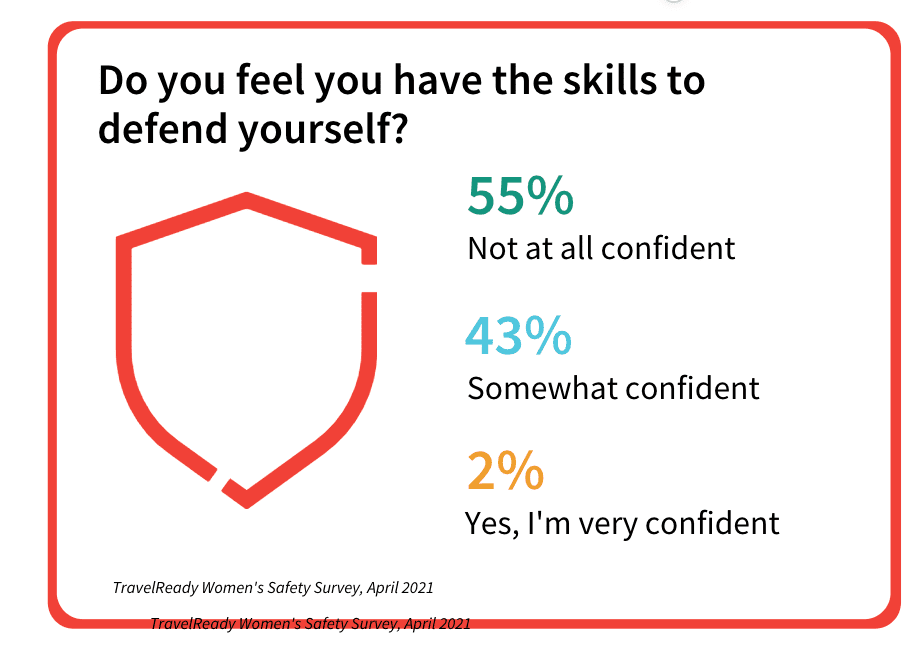
Let’s take back our power
Regardless of where we are, or what age we are, or whether we’re abroad or at home, we need to feel empowered and confident. Safety starts with the right mindset, using proven safety tips and common sense. The next step then is to empower ourselves with self-defense skills so that we can be ready for any situation, at home or abroad. We need not be victims.
Get started and take the first step with “Get Empowered with Self-Defense Tips From An Expert” and watch our video of Lorna Selig from Safe4Life.
More on Women’s Solo Safety
JourneyWoman Webinar: Human Trafficking and Travel — What You Need to Know
January 2024 is human trafficking prevention month. Join us to learn about human trafficking and travel on January 23, 2024.
Hold The Phone, Grandma: Safe Etiquette for Grandkid Holiday Snaps and Social Media
Suggestions for grandparents when posting holiday photos on social media, particularly when traveling with grandchildren.
How to Stay Safe When You Travel: Introducing our New Cybersecurity Course for Women
To help increase awareness of online safety before, during and after travel, JourneyWoman has introduced a new cybersecurity course with digital safety expert Paige Hanson, just in time for Cybersecurity Awareness Month (October).

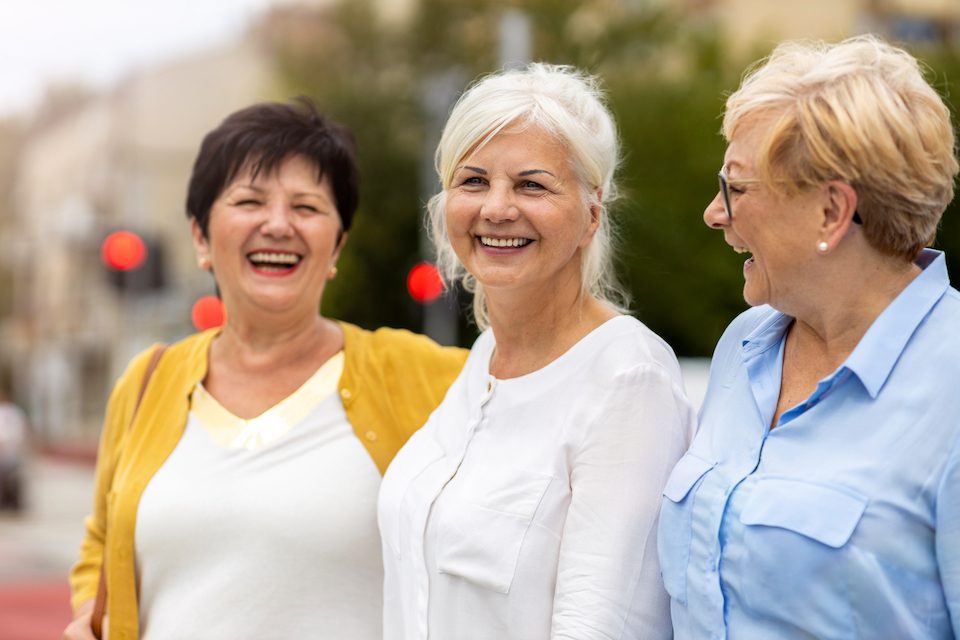



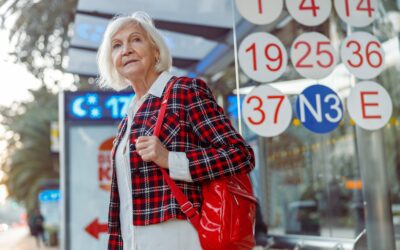
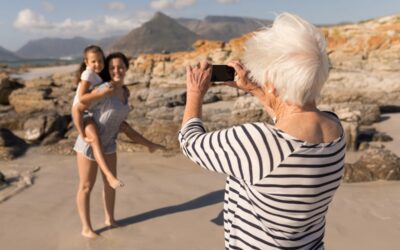
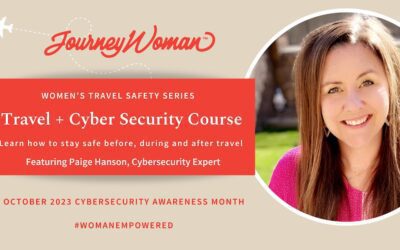
0 Comments
We always strive to use real photos from our own adventures, provided by the guest writer or from our personal travels. However, in some cases, due to photo quality, we must use stock photography. If you have any questions about the photography please let us know.
Disclaimer: We are so happy that you are checking out this page right now! We only recommend things that are suggested by our community, or through our own experience, that we believe will be helpful and practical for you. Some of our pages contain links, which means we’re part of an affiliate program for the product being mentioned. Should you decide to purchase a product using a link from on our site, JourneyWoman may earn a small commission from the retailer, which helps us maintain our beautiful website. JourneyWoman is an Amazon Associate and earns from qualifying purchases. Thank you!
We want to hear what you think about this article, and we welcome any updates or changes to improve it. You can comment below, or send an email to us at [email protected].